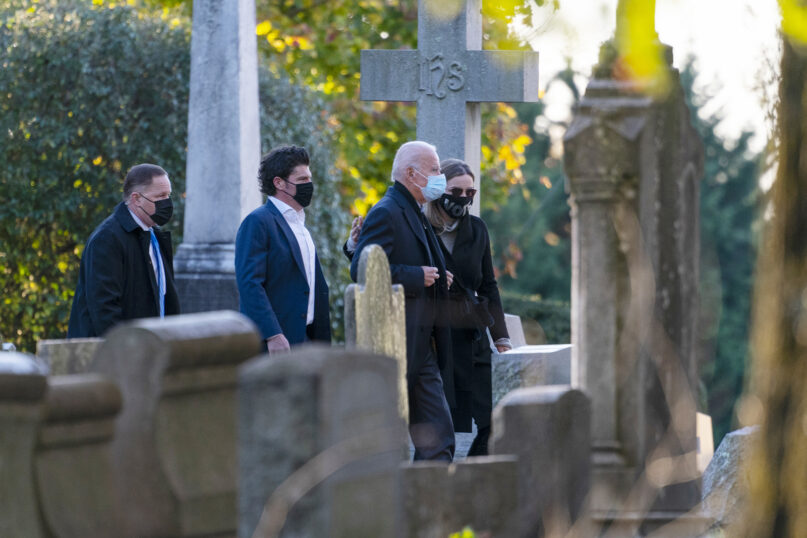(RNS) — At the end of the semiannual meeting of the U.S. Conference of Catholic Bishops (USCCB) last week, the organization’s president, Los Angeles Archbishop Jose Gomez, announced formation of a working group to examine the “challenges” posed by having a Catholic president of the United States who supports abortion rights.
The new working group immediately stirred a degree of agita from commentators who criticized the absence of policy study committees four years ago. “In what moral universe does Biden require a Catholic task force when Trump got a free pass?” asked Dartmouth religion professor (and Episcopal priest) Randall Balmer in a Los Angeles Times Op-Ed.
Actually, the bishops didn’t give Trump a free pass, either. A month after their November 2016 meeting, they established a working group on immigration that, among other things, was charged with responding to anticipated executive orders from the president-elect. (The chair was Gomez, then the USCCB’s vice president.)
Biden’s election, however, creates a “difficult and complex situation,” Gomez said. “Among other things, it creates confusion among the faithful about what the Catholic Church actually teaches on these questions.”
While it’s hard to imagine any Catholic these days being confused about what their church teaches about abortion, you can understand the anxiety. According to their most recent guidelines for Catholic voters, the bishops’ “pre-eminent priority” is “the threat of abortion.”
While Biden probably won’t have the votes to do away with the Hyde Amendment, which bars federal funding for abortions, he’s almost certain to cancel the Mexico City policy, which denies U.S. aid to international NGOs that sanction abortion in any way. Having a pro-choice president who goes to Mass regularly might send the faithful the wrong message about Catholic priorities in the public sphere.
For the bishops, the situation is not unprecedented.
In 1960, their priorities were federal aid for parochial schools and the appointment of a U.S. ambassador to the Vatican. Democratic presidential nominee John F. Kennedy, faced with the deep-seated Protestant belief that a Catholic president would be in thrall to the church hierarchy, said he was against both.
In the Kennedy camp, there was a well-founded suspicion that the country’s leading prelate, Cardinal Francis Spellman of New York, not only opposed his candidacy personally but was working behind the scenes to undermine it.
In a memo to a colleague at the time, The New York Times’ Paul Hofmann said that the Apostolic Delegate to the United States, the Rev. Egidio Vagnozzi (later Cardinal Vagnozzi), had told him off the record that “a sophisticated current among Roman Catholics in the U.S. and in the Vatican feels that a Roman Catholic in the White House at this moment might do more harm than good to the Church.”
As president, Kennedy advanced neither of the bishops’ policy priorities even as the Second Vatican Council, convening in 1962, revised church teaching in ways that upset and alienated conservatives. The election of Joe Biden comes at a time of similar contention within the church, and the American bishops’ new working group needs to be seen in that context.
On climate change, the death penalty, capitalism, the poor and the immigrant, Francis is hardly out of step with his papal predecessors, but there is a sense that he is more serious about these issues than they were, less serious about maintaining a hard line on abortion, homosexuality, divorce and women in leadership roles. It’s an agenda that conservative Catholics in the U.S. — including a majority of the bishops — regard with indifference at best, and some with open hostility.
That Francis openly criticized President Trump and was among the first world leaders to congratulate President-elect Biden has not been lost on anyone. The pope’s strongest supporters in the American episcopacy have expressed concern that the new working group represents an unnecessary posture of confrontation with the incoming president.
Washington Archbishop Wilton Gregory, who will officially be made a cardinal on Nov. 28, emphasized his own desire to find “common ground” with the Biden administration.
Long story short, Joe Biden of Scranton, Pennsylvania, may be a throwback to the pious urban Catholicism of the early and mid-20th century. But he is also a Vatican II Catholic who sees his faith as all about working for social and economic justice in concert with those of other religious traditions.
In the civil war raging within American Catholicism, that puts him into the Party of Francis. Small wonder Gomez et al. worry about him sowing confusion among the faithful.






